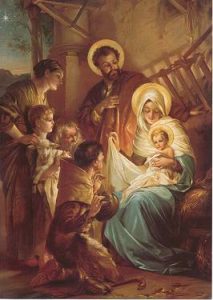The Birth of Jesus
While the Gospels of Mathew and Luke disagree somewhat about the details of the birth of Jesus, they both wrote that Jesus wasn’t conceived conventionally. That Mary experienced a divine conception when she was still an unmarried virgin. A fact that is supported in both Jewish and roman writings from the first and second centuries. When we have supporting evidence from friend and foe, pagans and Christians, it is fairly convincing.
We also have evidence that an unmarried mother two thousand years ago faced certain death. As giving birth while out of wedlock meant death by stoning as prescribed by jewish law. Even today in certain parts of ‘Palestine’ women are killed for losing their virginity out of wedlock. So Joseph kept the news of Mary’s pregnancy a secret and married her just before birth, perhaps saving her life.
The exact date of Jesus’ birth in unclear. But we do know when Herod the Great died and this is a good indicator. In Josephus’ Antiquities, the birth of Jesus happened less than a year before the death of Herod the Great. And based on a lunar eclipse that Josephus noted around the time of Herod’s death, this would be around 4BC. Matthew also states in his Gospel that Jesus was born in Herod’s reign (Matthew 2:1).

We must give credence to Josephus. Since his records appear to be accurate when cross checked against his contempories.
We know from church records in the second century, when Christianity was growing very strong, it was widely believed that Jesus was born in Bethlehem of Judea ( as distinct from Bethlehem of Galilee further north). Luke’s Gospel, written in Greek, is the only Gospel that tells the Christmas story, no room at the inn, etc. Its not mentioned in any of the other Gospels. But was Luke influenced by Micah’s prophecy when states that the saviour would be born in Bethlehem, near where David was from and where David’s heir was expected to be born (Micah 5) ?
Today we can see the spot where Jesus was born. The church of the nativity was built over the spot to mark it forever. We do know a certain amount about Bethlehem 2000 years ago. It was common to have caves under the houses which were used as stables for the animals. This both kept the animals safer and kept the house warm especially in winter.
We can even see this in many villages today in Israel and Palestine. Yattah being one of them, where mangers were common, as this was the place to feed the animals. Even today villages in the poor areas of the West Bank reenact the nativity scene where the animals and the people, including newly born babies, live in the same place.
The Birth of Jesus fulfilled over 300 Old Testament prophecies of the Messiah. The prophecies were written independently by many authors, in numerous books over a 1000 years.
The sceptre (a Hebrew symbol of governmental authority) shall not depart from Judah, nor a lawgiver from between his feet, until Shiloh (Hebrew, the “Messiah”) come; and unto Him shall the gathering of the people be. (Genesis 49:10). This passage is interpreted as the time of the Messiah’s birth being before the Jewish people lost their sovereign power. This occurred when Archelaus, the son of Herod the Great, took the throne and inherited much of his fathers kingdom, including Judea early in the 1st Century. And we can see that much attention was given to these prophecies by the religious hierarchy in Judea at that time as noted when they uttered, “Woe to us, for the scepter has been removed and the Messiah has not come!” (Talmud, Babylon, Sanhedrin). Unknownly to then, Jesus had already been born and was growing up in Galilee.
“But thou, Bethlehem Ephratah, though thou be little among the thousands of Judah, yet out of thee shall he come forth unto me that is to be ruler in Israel; whose goings forth have been from of old, from everlasting.” (Micah 5:2). This passage is interpreted as a small insignificant town Bethlehem, being the place of the Messiah’s birth.
Therefore the Lord himself shall give you a sign; Behold, a virgin shall conceive, and bear a Son, and shall call His name Immanuel. (literally, “God-with-us” in Hebrew) (Isaiah 7:14). For unto us a child is born, unto to us a son is given: and the government shall be upon his shoulder: and his name shall be called Wonderful Counsellor, Mighty God, Everlasting Father, Prince of Peace (Isaiah 9:6). This passage is interpreted as The Messiah been born of a virgin.
All of these prophecies show up in the Dead Sea Scrolls (greatest manuscript discovery of modern times – originally from a library of a jewish sect) and the Septuagint (Greek translations of Jewish scriptures mainly because many Jews began to spread from their homeland and were beginning to lose their Hebrew language but also gave many non-jews a glimpse into Judaism. Both the Dead Sea Scrolls and the Septuagint have been scientifically proven to exist prior to the time Jesus was born.
Matthew provides only a few clues as to the origin of the three wise men or the Magi. He uses the phrase from the east and they came from their own country, as distinct from Judea. Some historians believe they came from Babylon, others from Persia. They came to worship the infant Jesus as the new born king of the Jews.